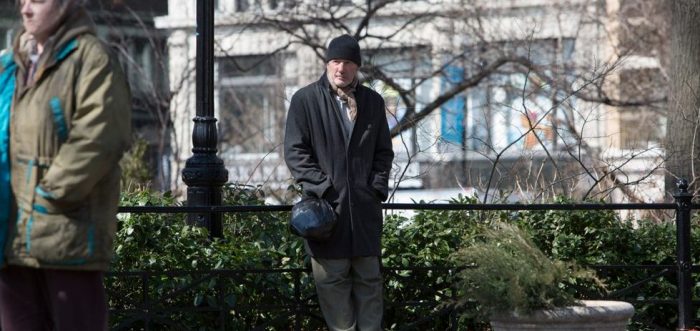
“I don’t exist!” cries George, a New York vagrant played by a whiskered Richard Gere. “They think we’re clowns! I’m a clown!” By this point, Time Out of Mind, a cornucopia of sombre character study and ambiance from writer-director Oren Moverman, has steered its homeless lead with intentional listlessness from shelter to stopgap, and it’s taken until now—just past halfway in the 120-minute runtime—for him to cotton on to the real way in which society recognises him, or doesn’t. It’s an epiphany that should feel naturalistic, but instead it’s the point at which Moverman gives up the New Hollywood ghost of allegorical subtlety and proclaims the rest of his intended message through a bullhorn. The fact that they come so close to proficiency beforehand makes it an especially frustrating experience.
Out of sight is out of mind, and so the method Moverman, returning Rampart DP Bobby Bukowski and their sound team use to give us sight beyond our sight is to soak the aesthetic in a melange of visual barriers and overlapping sound mixes. This in turn allows us to understand the vicious cycle George is caught in—he drinks to forget pain, only for it to be the thing that causes him more as public servants, shelter volunteers and societal gatekeepers condescendingly dress him down. The title card alone splashes its letters across a Manhattan vista, as if to plant a stake on the entire city’s milieu and attempt to highlight its savage faultlines. As lofty as that goal is, they make a solid start—the same camera shooting this vista then pivots slowly back into the apartment it sits in, to show a surly removalist (played by go-to Brooklynite Steve Buscemi, no less) stomping through and finding Gere dozing in the bathtub. Bukowski manipulates the environment to hang a frame around Gere’s puppy-dog eyes, making him that much more sympathetic as this hired hand badgers him from off-screen with an impatient “c’mon, let’s go”. For Gere’s part, he convincingly looks for his bearings as we do, mumbling and articulating details of his past as a tool to inch forward, somewhere, in what is a layered and lively performance.
It’s when we get to street level that the problems begin. While the screenplay smartly dispenses with dialogue and allows us to put George’s nigh-unconscious behaviour patterns together, Moverman and company fall short in trying to realise this with the same immersive quality as an Altman or Ashby picture. The sound design, for one thing, is incredibly spotty—while on-set sound cuts through and bounces off the walls with that heart-seizing power urban environments hold, the ADR for off-screen conversations and radio music is distractingly clean, with some conversations sounding as outlandish as the pedestrian patter in a Grand Theft Auto game. There’s similar strangeness in the music supervision, which generally consists of nigh-anonymous diegetic tracks but occasionally uses overtly distracting cues–one of which is a fine but woefully misplaced acoustic track by Jena Malone, who is in the film itself as George’s estranged daughter.

Formal blemishes like those would be just that if they didn’t combine their weight with a story that struggles to find the same grace as its opening moments. Much of it concerns George trying to get out of sleeping on stoops and shelter beds only to be blocked by self-defeating bureaucracy, but the power that narrative holds is thwarted by fellow transients Dixon (Ben Vereen) and Jack (Jeremy Strong) coming into his life; particularly the former as he tags along with George to DMVs and government agency buildings. Moverman clearly sees these two chatty men as unlikely voices of reason, but their verbal diarrhoea, which has Vereen quoting Bible passages and Strong giving an expletive-laden “welcome to the real world” monologue, takes so many high-faluting digressions and fills up so much of the runtime that it knifes the established realism in the heart. Maddeningly, it does find coherence in Malone and Geraldine Hughes as a hospital nurse, who are marvelously grounded in their exchanges with Gere but little used. Bukowski does make a bold camera move or two to try and put back in the world he and Moverman first introduced, but it rings of desperation amid the chatty, unsubtle theatrics, and only displaces us further back into a typical way of seeing.
It’s impossible to avoid comparisons to Heaven Knows What, another film about those falling through the societal cracks of New York, released in the same year. That film was scripted by a lead actor (Arielle Holmes) who had done time on the streets, and shot by a pair of directors (Josh and Benny Safdie) who know how to lift from cinema vérité in a purposeful way, which made for a work that is both giddy with emotion and wincingly true.1 It would be unfair to knock Gere’s casting in contrast simply for not ever being homeless, especially since the story takes advantage of his dashing looks—it’s made evident several times that George has typically been a womaniser and thus someone who has previously gotten what he wants quite easily, so it legitimises his present-day confoundment. Unfortunately, Moverman can’t find a consistent application for this, since one bungled attempt to shack up with Hughes’ character rings true but another instance where he flashes his improbably made-up face and beds a female vagrant (Kyra Sedgwick) feels oddly comedic. It even finishes with kids gawking at his near-naked bod as he wakes up—fitting for a clown, maybe, but not for an engrossing character piece, which is ultimately beyond Time Out of Mind’s reach.
Around the Staff
| Kenneth Kriheli | |
